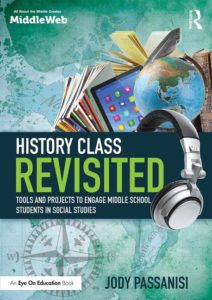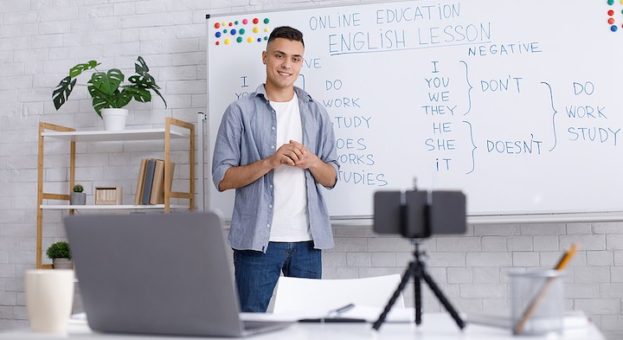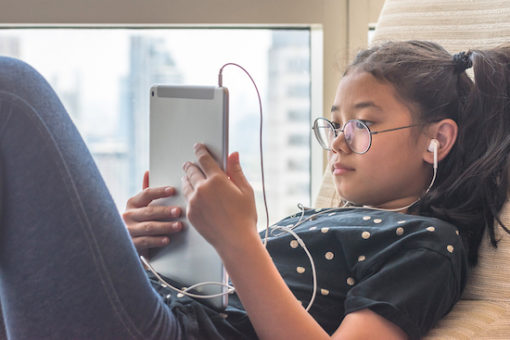Writing a ten years in the past, Jody Passanisi and Shara Peters wondered if on-line finding out could change actual physical faculty. Now as they evaluate the charges to college students of pandemic driven education and learning, the academics turned college leaders have their reply: Information in a human vacuum just can’t sustain alone.
By Jody Passanisi and Shara Peters
Nearly 10 a long time in the past, we asked the next query, which was, at the time, hypothetical:
“Could an on-line finding out process swap a classroom?”
In a 2012 post for Scientific American, we answered our personal dilemma: “Yes, it could. Will it? Most surely not.”

Jody
When we wrote this, we ended up classroom lecturers, prognosticating about the 2012 zeitgeist of worry among educators: so significantly technological innovation. Indeed, at the time it felt like we were being using a big wave of new technological know-how initiatives. In a hurry to undertake these new equipment, a lot of educators were being working with the applications for the tools’ own sake, not wanting their craft to seem outdated.

Shara
Other people balked at the encroachment of tech resources onto their instructing territory. The dilemma was in the air: could that know-how at some point make classrooms and the in-individual classroom mastering experience obsolete? What would that necessarily mean for education?
At that time we strongly felt that – no, even as know-how enhances exponentially, classrooms won’t be replaced. We have now lived as a result of a time time period that caused us to dilemma the objective and method of every little thing we do, and that also threw us into the arms of technology as a essential usually means to education’s finishes.
10 years and just one pandemic later on, the globe has given us a likelihood to exam our principle. We have observed what is lost when we really do not have accessibility to the brick-and-mortar lecture rooms. We have felt the oxygen go away the home at the thought of likely again to on-line discovering, even for a handful of days.
Most pupils and educators throughout the state expert this to varying degrees throughout the pandemic. It will be years ahead of we realize the depths to which pupils had been impacted from this paradigm shift in their training.
Our Reasoning in 2012
Ten several years in the past we laid out a simple argument for why on the web studying wouldn’t totally period out in-human being studying. The foundation of our argument was as follows:
● Lecture rooms are not just for disseminating information and facts: college students have to have to discover expertise to unpack that data – consider it, evaluate it and create their have understandings.
● In order to do all of the earlier mentioned, learners require to be able to collaborate with other students and their academics.
● Our economic system is primarily based far more on assistance and experience-to-confront or at minimum interpersonal interactions relatively than on production pupils want to have the capabilities to collaborate with many others.
● Education and learning (of younger learners particularly) is as substantially about understanding how to be a man or woman in the globe as it is about getting educational understanding and competencies.
● Lecturers are an invaluable resource and have been since endlessly changing teachers with tech would be absurd.
Now that the question is no for a longer time a hypothetical, we can properly say that we concur with all of the higher than – and a lot more.
Latest Reasoning: Reflections from a Pandemic
Social and Psychological
Quite a few college students wilted in the course of on the internet understanding. This isn’t to say that some children did not get pleasure from or even prosper academically throughout length studying, but they have been in the minority. Factors that we all took for granted right before the pandemic – passing people in the corridor, expressing a short hi there, just currently being all around other individuals – all of these points have been gone. Students were being understanding in a social vacuum.
Just one mitigating factor ended up breakout rooms, which permitted learners to interact with every single other in modest teams. But some pupils had been so self-aware on these virtual platforms that they couldn’t switch on their cameras. And lots of students understood, deep in their intestine, that this was just not natural. It produced it really hard for them to get in.
Early scientific tests of the outcomes of the pandemic display that being youthful (under 18) was a threat element for elevated mental wellness issues (WHO, 2022). Learners who are made use of to staying close to peers and trusted grown ups at school had been lacking a essential component of their assist system. Looking at persons by means of a monitor, even though greater than practically nothing, is no substitute for getting in-person.
All through the pandemic college students seasoned a psychological well being disaster with self-experiences of nervousness and depression doubling in the course of that time (Richtel, 2021). On line university can not be blamed for all of that enhance – the pandemic alone introduced about other issues and important considerations that afflicted psychological health and fitness – but we can be certain that the structure of on line education contributed to this enhance.
Kinesthetic prospects
Pupils are not meant to sit for eight hours straight. As a lot as we tried to mitigate students’ amount of money of time in front of a monitor by assigning asynchronous work, it all came down to currently being near to a display screen – pupils doing work on a product – even if not in an on-line course at the time.
College students who wanted to join to their friends would also chat on line or video game on the net. At the end of the day, college students would have a glazed search in their eyes. PE was a problem on these online mastering platforms – students would will need to be pushed to go outdoors – even if they lived in an spot the place they have been in a position to safely go outside the house or experienced PE as an supplying in a length understanding setting.
For some pupils, the main exercising and motion they practical experience is in faculty – and on-line faculty is the antithesis of movement no subject how a lot of Go Noodle, Simon Says, or other innovative physical exercise and mind-break pursuits lecturers designed or utilized creatively for the duration of the pandemic.
Interpersonal Competencies
All of the compact and large social interactions that learners have in a working day enable them to understand how to be in the environment with other people. These interactions are not usually basic. Instructors, directors, and other training industry experts are there to aid pupil finding out in this regard: when an difficulty will come up in between pupils, lecturers can give the students resources to remedy the difficulty and assistance mediate troubles.
Without having these possibilities to find out from interpersonal interactions, students continue being in their very own solipsistic bubble, not remaining challenged by other individuals – and ultimately, not mastering these crucial interpersonal techniques.
In the extremely tightly organized on-line classroom, interactions are planned – and quite seldom by happenstance as would be the situation for an interaction on the playground or the basketball court docket. Also: online, pupils don’t have the organic anchors of in-human being discovering. Strolling away in the physical globe is considerably more difficult than turning off your display screen.
Accessibility
All of these issues have been, in some techniques, challenges faced by the privileged. Quite a few students across the state didn’t have much entry to engineering, which resulted in studying reduction and isolation. There is not nonetheless equity in conditions of engineering and what is readily available for ALL learners.
Academics
We are equally directors in independent educational institutions in California. Supporting our instructors, and of training course our students, for the duration of the pandemic was of the greatest significance. The situations of 2020 and 2021 burnt out our educators (Schabram & Heng, 2021). The pressures of hybrid classrooms (the place each on the net and in-individual learners are existing), Covid protocols, Covid fears, and the lack of normalized connections between colleagues and students ended up all a “motivation suck.”
To have on the net lecture rooms, you will need on the internet academics – and just after this practical experience, while having an online choice can be incredibly useful with well being emergencies or inviting company into classrooms, and other situations of the extenuating wide range – lecturers are possible not lining up to train in this format.
Unintended Consequences of Online Finding out
As administrators, we are deeply knowledgeable that college students interact with tech in different ways now than they did ahead of the pandemic. Middle grades college students figured out early on that they could binge watch Netflix throughout class, and teachers had a more challenging time catching them. They got entirely used to getting capable to information pals and look for for content with no checks. They had backchannels on Discord and were being a lot more adept at getting all around articles blocks.
In the end, they made the routine of splitting their concentration amongst a selection of distinct electronic stimuli, all of which are created to activate their dopamine degrees extra conveniently and simplistically than university and people essential understanding routines that involve far more complex engagement.
The number of terrible tech behaviors learners picked up is too fantastic to record right here, enable on your own the material they have been uncovered to that was past teacher and spouse and children management. Now that they are again in the classroom, we see students who can not steer clear of multitasking. Together with that, we come across an boost in engineering-related infractions.
Resets are needed but complicated to implement as students’ tech use is normally furtive, both at household and in the classroom. Students’ brains are not formulated enough, nor do they have all the expertise and equipment, to have unfettered obtain to the Internet, game titles, and social media.
The absence of brick-and-mortar classrooms has also led to learners who have missing even a lot more of a sense of an consciousness of some others further than what’s developmentally envisioned. Little ones want so a great deal additional prompting to cleanse up just after on their own, to consider care of their classroom and school neighborhood.
Teachers need to have to re-educate selected fundamental local community techniques that enable pupils to keep in mind that they will need to imagine right before they talk, be conscious of people today about them, get accountability for their steps, and look out for other members of their communities.
All of these so-known as “soft skills” alongside with empathy, self-regulation, and local community duty are cornerstones of classroom curricula. And whilst online finding out enables for the delivery of written content, albeit not essentially in the most engaging way, there are minor to no options for pupils to exercise these other abilities in local community.
Can on the internet studying substitute the classroom? Here’s the 2022 reply to the 2012 query: No. Not if we want pupils to grow up to care about the group and the environment about them, and to be adept at moving as a result of the environment with a modicum of self- and other-recognition.
Closing Thoughts
We are not stating that there isn’t a place for technological know-how in the classroom – we are substantial proponents of purposeful tech use à la the SAMR model (Puentedura, 2006). On the other hand, we have now experimented with the on the web classroom method, and, when comparing that knowledge to in-man or woman faculty, people positive aspects of in-man or woman training – social connections, psychological help, interpersonal interactions, sense of obligation to self and neighborhood and physical motion – can not be overstated, particularly for young pupils.
Actually, studying is not just about know-how and information – it is the interactions that solidify that understanding. It is the emotions of being close to persons, in neighborhood, that can make it possible for pupils to find out about by themselves and a single an additional. Material in a human vacuum simply cannot maintain itself. We have observed the upcoming of on line finding out – and it is just not sufficient for a full training.
Works Cited
Passanisi, J. and Peters, S. (2012, June 28). Instructors and administrators, really don’t be afraid of technological innovation: It won’t switch the classroom. Scientific American Web site Network. Retrieved March 7, 2022, from https://weblogs.scientificamerican.com/guest-website/teachers-and-directors-dont-be-frightened-of-engineering-it-wont-substitute-the-classroom/
Puentedura, R. (2006, August 18). Transformation, Technological know-how, and Education. Retrieved March 7, 2022, from http://hippasus.com/methods/tte/
Richtel, M. (2021, December 7). Surgeon normal warns of Youth Mental Wellness Disaster. The New York Instances. Retrieved March 7, 2022, from https://www.nytimes.com/2021/12/07/science/pandemic-adolescents-melancholy-panic.html
Schabram, K., & Heng, Y. T. (2021, April 28). Educators and Learners Are Burned Out. These Methods Can Enable. Harvard Company Publishing Education. Retrieved March 7, 2022, from https://hbsp.harvard.edu/inspiring-minds/educators-and-students-are-burned-out-these-methods-can-assistance
Entire world Overall health Firm. (2022, March 2). Psychological well being and covid-19: Early evidence of the pandemic’s effect. who.int. Planet Health Organization. Retrieved March 8, 2022, from https://www.who.int/publications/i/merchandise/WHO-2019-nCoV-Sci_Temporary-Psychological_health-2022.1

Shara Peters is the Common Studies Principal at Pressman Academy in Los Angeles and has previously held roles at educational institutions in Southern California like Trainer, Curriculum Director, and Head of School. She has published about education and learning for Scientific American and Education 7 days, and co-hosted a podcast, “Find You a Instructor,” alongside with Jody Passanisi. Shara was a 2019 receiver of the Pomegranate Prize from the Covenant Foundation, a countrywide management award offered to Jewish educators for outstanding service as emerging specialists in options throughout the country.
Jody and Shara were being the originators of MiddleWeb’s Foreseeable future of History blog. Come across their posts listed here.


